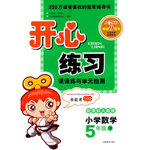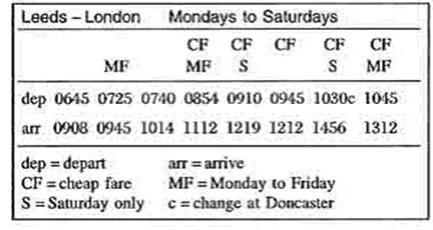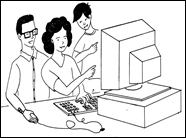题目内容
阅读下面的材料,然后根据材料内容回答所提问题。
You may have known several kinds of police, traffic police and street police. But have you ever heard of energysaving (节能) policemen?
A group of 22 of these new policemen went to work last week in Beijing. They go around the city to see the use of energy in hotels, office buildings, shopping centers and other public places. One of their aims is to make sure that these places have set their air conditioning (空调) no co oler than 26℃.
oler than 26℃.
“If everyone sets their air conditioning at 26℃, Beijing will save 400 million kilowatt-hours of electricity in one summer,” said a TV advertisement.
At the beginning of this month, China made its first action plan to fight pollution. It aims to reduce energy usage by 20% and increase renewable (可再生的) energy up to 10% from 7% by 2011.
To introduce the public to a green life, last week Beijing held a show on energy-saving technology and products.
“We want to tell people that there are certain ways to protect the environment. Each of us can find effective ways to do it in our daily life,” said Liu Qianguang, an environmental engineer in Beijing.
小题1:What do the energy-saving policemen usually do in Beijing?
_________________________________________________________
小题2:How much electricity will be saved in one summer if eve ryone in Beijing sets their air conditioning at 26℃?
ryone in Beijing sets their air conditioning at 26℃?
_________________________________________________________
小题3: Has China planned to reduce energy usage by 20% by 2011?
_________________________________________________________
小题4:Why did Beijing hold a show on energy -saving technology and products?
-saving technology and products?
_________________________________________________________
小题5:Who is Liu Qianguang?
_________________________________________________________
You may have known several kinds of police, traffic police and street police. But have you ever heard of energysaving (节能) policemen?
A group of 22 of these new policemen went to work last week in Beijing. They go around the city to see the use of energy in hotels, office buildings, shopping centers and other public places. One of their aims is to make sure that these places have set their air conditioning (空调) no co
 oler than 26℃.
oler than 26℃.“If everyone sets their air conditioning at 26℃, Beijing will save 400 million kilowatt-hours of electricity in one summer,” said a TV advertisement.
At the beginning of this month, China made its first action plan to fight pollution. It aims to reduce energy usage by 20% and increase renewable (可再生的) energy up to 10% from 7% by 2011.
To introduce the public to a green life, last week Beijing held a show on energy-saving technology and products.
“We want to tell people that there are certain ways to protect the environment. Each of us can find effective ways to do it in our daily life,” said Liu Qianguang, an environmental engineer in Beijing.
小题1:What do the energy-saving policemen usually do in Beijing?
_________________________________________________________
小题2:How much electricity will be saved in one summer if eve
 ryone in Beijing sets their air conditioning at 26℃?
ryone in Beijing sets their air conditioning at 26℃?_________________________________________________________
小题3: Has China planned to reduce energy usage by 20% by 2011?
_________________________________________________________
小题4:Why did Beijing hold a show on energy
 -saving technology and products?
-saving technology and products?_________________________________________________________
小题5:Who is Liu Qianguang?
_________________________________________________________
小题1:They go around the city to see the use of energy in public places.
小题1:400 million kilowatt-hours of electricity will be saved.
小题1:Yes, it has.
小题1:To introduce the public to a green life.
小题1:He is an environmental engineer in Beijing.
略

练习册系列答案
 开心练习课课练与单元检测系列答案
开心练习课课练与单元检测系列答案
相关题目
 Make sure you have two pencils and anything else you were asked to bring.
Make sure you have two pencils and anything else you were asked to bring. S__小题4:__ things are luminous(发光的). Most of the things you see are not giving off light of their own. They are simply reflecting(反射) light that falls on them from the sun or some other luminous bodies. The moon, for example, doesn't give off any light of i__小题5:_ own. It's non-luminous. You see it because sunlight falls on it and some of it reflects in your d__小题6:__. So moonlight is only second-hand sunlight.
S__小题4:__ things are luminous(发光的). Most of the things you see are not giving off light of their own. They are simply reflecting(反射) light that falls on them from the sun or some other luminous bodies. The moon, for example, doesn't give off any light of i__小题5:_ own. It's non-luminous. You see it because sunlight falls on it and some of it reflects in your d__小题6:__. So moonlight is only second-hand sunlight.
 n before ten o'clock.
n before ten o'clock. —_____,I’ll go and get her.
—_____,I’ll go and get her. I was born in the computer age. 小题1:. They were already adults when the first personal computer came out. But with the development of technology, more jobs need skills like typing, sending e-mails, etc.
I was born in the computer age. 小题1:. They were already adults when the first personal computer came out. But with the development of technology, more jobs need skills like typing, sending e-mails, etc.